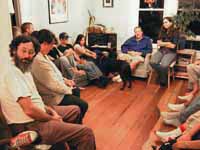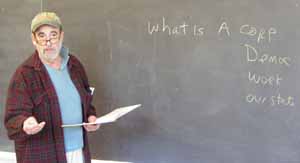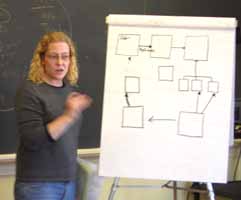
Click here for
Democracy School schedule page.
Click here for curriculum.
|
If you would like to set up one or a series of Democracy Schools in
your area, first please read carefully the information below. If you decide
to proceed, please contact
Stacey Schmader at the Community Environmental
Legal Defense Fund (CELDF),
(717) 709-0457. You can check the current
Democracy School locations and schedules here.
What's Democracy School?
Why run a Democracy School in my area?
How do we set it up?
What should we charge participants?
What are the costs?
What's after Democracy School?
What's Democracy School?
At the most fundamental level, our weekend-long Democracy School
addresses why
democratic self-governance is impossible when corporations wield
constitutional rights to deny people's rights, and how we are able
to rectify these wrongs.
 Democracy School was created by the Community Environmental Legal Defense
Fund (CELDF) and Richard Grossman, co-founder of the Program on Corporations,
Law, and Democracy (POCLAD). Democracy Schools were launched with five
weekend sessions at Wilson College in Chambersburg, Pennsylvania in 2003, and
the number of schools is growing rapidly. In 2004, the Democracy Schools have
been held five times at Wilson College, three times at Boston College, once
in Brattleboro, and once at the North Carolina Blue Ridge Assembly.
Participants have come from across the country, including California, Iowa,
Texas, North Carolina, Georgia, New York, New Hampshire, Massachusetts,
Washington, Alabama, Vermont and Pennsylvania.
Democracy School was created by the Community Environmental Legal Defense
Fund (CELDF) and Richard Grossman, co-founder of the Program on Corporations,
Law, and Democracy (POCLAD). Democracy Schools were launched with five
weekend sessions at Wilson College in Chambersburg, Pennsylvania in 2003, and
the number of schools is growing rapidly. In 2004, the Democracy Schools have
been held five times at Wilson College, three times at Boston College, once
in Brattleboro, and once at the North Carolina Blue Ridge Assembly.
Participants have come from across the country, including California, Iowa,
Texas, North Carolina, Georgia, New York, New Hampshire, Massachusetts,
Washington, Alabama, Vermont and Pennsylvania.
Democracy School teaches a paradigm shift, a dramatic new way of looking at
our role as citizens in a democracy, and how to assert our inalienable rights
as a sovereign people. Attendees explore the limits of conventional
regulatory organizing and learn how to "reframe" single issues to confront
the rights used by corporations to deny the rights of communities, people,
and the earth. Lectures cover the history of people's movements and corporate
power, and the dramatic recent organizing in Pennsylvania by communities
confronting agribusiness, sewage sludge, and quarry corporations. Included
with Democracy School are a 190-page notebook of background reading
material, and a copy of Defying Corporations, Defining Democracy. For a
historical review of the Pennsylvania work through the end of 2003, see a
feature article that appeared in
Orion Magazine.
 Attorney Thomas Linzey founded CELDF in 1994 with Stacey Schmader to help
communities organize to oppose corporate assaults on republican democracy.
Richard Grossman and Thomas Linzey authored many of the written materials
that attendees receive for the School.
Attorney Thomas Linzey founded CELDF in 1994 with Stacey Schmader to help
communities organize to oppose corporate assaults on republican democracy.
Richard Grossman and Thomas Linzey authored many of the written materials
that attendees receive for the School.
Dedication: Democracy School is dedicated to the memory of Daniel
Pennock, a 17-year-old boy from Berks County, Pennsylvania, who died in
1995 after being exposed involuntarily to land applied sewage sludge.
Daniel's parents, Antoinette and Russell Pennock, travel across
Pennsylvania to end the practice of sludge disposal, by which waste
management corporations reap massive profits hauling and spreading sludge
on farmland.
Why run a Democracy School in my area?
The most urgent reason for holding a Democracy School is when a
corporation wants to put a harmful operation in a community
for its own profit and to the detriment of the residents.
Democracy School provides tools for communities to bypass the
regulatory system, where they are destined to lose, and to learn
to defend themselves where they have a fighting chance,
on the basis of our constitutional and
inalienable rights as citizens in a democracy.
Democracy School can also be a vital component of public education
-- where people can learn essential American history that was
never taught in our schools, and see how these lessons may be applied
to further democracy, and challenge the rule of the very few over
the vast majority of us. The Schools help us prepare to confront
corporate harms, whether they are imposed by corporations themselves
or by our government acting on their behalf.
How do we set it up?
For the most part Democracy Schools are organized by people who have
already attended at least one. Under some circumstances we will work
with someone who has not yet participated.
The first step towards setting up a Democracy School is to talk with
other people in your group or larger community who you think would
be interested. If there are activist groups that will be involved,
it's important to get at least two people from each group so they can
support each other when they go back to their groups to explain the
work (and it's usually not possible to explain a weekend of Democracy
School in a few sound bites). Note that typically about half of the
attendees sign up well in advance, and the other half in the last week or
two before the course begins. Feel free to contact Adam if you have
questions about how best to approach people or need further information.
 The maximum number of participants is around fifteen.
If it appears that you can get from ten to fifteen people to attend, the
next step is to call us to discuss your proposed Democracy School.
We will work with you to set a date -- usually over a weekend from Friday
at 7 p.m. through Sunday at noon. Pick at least three possible dates
to make sure that there are instructors available for at least one of
those times. Upon receipt of the administrative fee (explained below),
we will schedule two instructors for your Democracy School, and provide
a link from the main Democracy School web page to your website (or, if you
don't have a website, we will work with you to construct a web page for a
minimal fee).
The maximum number of participants is around fifteen.
If it appears that you can get from ten to fifteen people to attend, the
next step is to call us to discuss your proposed Democracy School.
We will work with you to set a date -- usually over a weekend from Friday
at 7 p.m. through Sunday at noon. Pick at least three possible dates
to make sure that there are instructors available for at least one of
those times. Upon receipt of the administrative fee (explained below),
we will schedule two instructors for your Democracy School, and provide
a link from the main Democracy School web page to your website (or, if you
don't have a website, we will work with you to construct a web page for a
minimal fee).
An important item to consider is how many people, if any, will need
overnight accommodations, and to what extent you want to include the
accommodations in your tuition. For example, at the Pennsylvania school
which takes place in Chambersburg, most participants are from out of town.
Accordingly the sponsoring organization, CELDF, arranges for lodging and meals
at a local school, Wilson College. In contrast, most of the participants
at the Boston Democracy School live in the local area, and the sponsoring
organization, the Center for Democracy and the Constitution, simply refers
those from out of town to reasonably priced accommodations.
What should we charge participants?
What you charge participants is entirely up to you. It will depend on a
number of factors, such as how much (if anything) you pay for a facility to
host the Democracy School, whether you have supplemental funding, whether
you are including the costs of lodging and meals, and the extent to which you
want to offer a sliding scale.
For example, the tuition for the
Pennsylvania School,
which includes lodging and meals, is $385. The
Boston School,
which includes snacks and one working meal, but no lodging, is $275.
The Boston School offers full or partial scholarships to up to a third of the
participants -- the availability of scholarships is up to each individual
School.
Finally, you will want to be sure to post a clear refund policy, covering
cancellations on the part of the School, the participant, due to inclement
weather, etc. Check the Pennsylvania and Boston Schools for sample refund
policies.
What are the costs?
Here is an example of the costs of running a Democracy School. Costs for
each school will vary depending on local factors, transportation, etc.
- Instructor fee: $1,500 - $2,000 (two certified instructors)
- Instructor transportation, lodging and meals: $ variable
Transportation, lodging and meal expenses will depend entirely on distance
travelled and costs in your locality. As we continue to train instructors, more
will be available closer to your area thereby reducing costs.
- Facilities: $ variable
Costs for facilities depend entirely on how you decide to set up the School.
Some of our Democracy Schools get free space because the sponsoring
organization has a friend or Board member on a college faculty. Others pay
for space in a hotel or community organization building. Two additional items
are required: an easel with pad, tape, and markers, and a TV/VCR.
- Snacks and group meal: $15/participant
Democracy Schools usually provide snacks throughout the day. In addition,
a buffet lunch or dinner is also provided on Saturday, during which people
socialize and watch an excellent video on the corporatization of public
transportation, "Taken for a Ride." Beyond snacks and the buffet meal,
if participants are paying for food and lodging you will add those costs to
the tuition.
- Course Materials: approximately $35/person
Participants receive a 180-page notebook of pre-School readings -- we will provide
you with a master and you will make copies. Including the binder and labels,
the notebooks cost $15-20 apiece to reproduce; they are shipped to people at
least two weeks prior to School. Also included in the tuition is a copy of the
foundation book published by POCLAD, Defying Corporations, Defining
Democracy; these retail for $18 -- as a Democracy School sponsor you will
pay shipping but also receive a 40% discount from publisher Apex Press.
- Administrative fee: $150
The administrative fee, payable to the Center for Democracy and the Constitution,
helps cover our costs of making Democracy School
available across the country. It includes consulting time to help set up
your School, a master copy of the student notebook, and a copy of
"Taking Care of Business" by Richard Grossman and Frank T. Adams for every
attendee. It also includes a Democracy School web page template that you can
use on your website.
- Web page fee: Optional, $25
If your group doesn't have its own website, we will host your Democracy School
web page for you.
- Videotape of Thomas Linzey presenting the Pennsylvania story: Optional, $250
If you would like to view Thomas's original presentation during your Democracy
School (assuming that he isn't one of the instructors), this fee covers a
one-time use license. Otherwise the same material
will be presented by the Democracy School instructors.
A typical example of how the economics work out is as follows, assuming
fifteen participants who live in the local area (i.e., no hotel accommodations
or additional meals necessary) paying tuition of $275:
Instructors: $2,000
Travel,accommodations: 1,000
Classroom facility: 200
Snacks,meal: 225
Course materials: 525
Administrative fee: 150
TOTAL EXPENSES: $4,100
TOTAL INCOME: $4,125
|

What's after Democracy School?
Democracy Schools are not an end in themselves -- we teach them as
part of challenging corporate control of government and building a
democracy movement in this country. Therefore we see
Schools as a first step in moving communities to rights-based organizing.
There are a number of next steps to take, depending on local circumstances.
One is to send speakers into the community to educate others on rights-based
organizing. Another is to develop strategies and tactics to defend against
imminent or existing corporate harms. And finally, to continue sponsoring
Democracy Schools to move our organizing into wider and wider circles. Thomas
Linzey and CELDF will continue to consult with local groups as they move
forward.
For further information, please contact
Stacey Schmader at the Community Environmental
Legal Defense Fund (CELDF), (717) 709-0457.
|

|
Curriculum
Day 1, Evening
- Introductions of Attendees
- Discussion:
- "What is Our Concept of Democracy?"
- "What is Our History of Regulatory Activism?"
- "Does Our Work Vindicate Our Concept of Democracy?"
- How We Got Here: A Brief Overview of the School and
the Evolution of POCLAD/CELDF
|

|
Day 2, All Day and Evening (may include buffet dinner)
- The Historical Role and Nature of Corporations in the United States
- The Role of Corporate Charters
- The Conferral of Corporate Constitutional Rights
- A History of Peoples' Movements in the United States
- The American Revolution
- The Articles of Confederation and the Constitution
- The Anti-Federalists
- The Populists
- The Abolitionists and the Fourteenth Amendment
- Womens' Rights and the Nineteenth Amendment
- The Labor Movement
- What Have We Learned from These Movements?
- Common Theories, Strategies, and Actions
- Theory of the Constitution
- Theory of the Corporation
- Theory of Democracy
- Building on the Lessons of Prior Movements
- Building New Models of Organizing
- The "Single Issue: Model: From Reframing to Winning"
- Driving into Local Governing Arenas
- Challenging and Contesting Corporations
- Contesting Government Actions Empowering Corporations to
Usurp Community Control From Reframing to Drawing the Corporate
Response To Building New Constituencies To Winning
- Altering the Odds: Directly Challenging Corporate Rights
- The Porter Township, Clarion County Experience: Eliminating
Legal Privileges Claimed by Corporations

|
Day 3, Morning
- Building the Connections Amongst All Single Issues
- Our History of Collaterally Challenging Illegitimate Corporate Authority
- Breakout: Reframing Single Issues by Rethinking Several Issues
- An Exploration of Jurisdictions and Arenas
- Other Constituencies
- Critical Mass: Doing it Together and Building a Movement
- This is the Work: Groups Across the United States Applying New Models
- Discussion: How Do We Make Real the Promises of Democracy?
|
| | |
|

